Security is one of the core values for both consumers and businesses. It serves as a crucial cornerstone upon which trust is built. Security measures can protect various aspects, such as data, physical assets, or individuals’ identities. With cutting-edge technologies, AI biometrics has entered the market, introducing powerful tools in the realm of biometric data.
AI Biometrics Data
Today, we can find numerous infrastructural elements utilizing digital tools to track or identify specific objects. Biometric identification is most often associated with recognizing specific individuals. AI systems use pre-designed and programmed templates of individuals to compare them with data scanned in real time during verification.
Biometric data can include fingerprints, facial features, iris patterns, or voice tones. In face recognition, AI can accurately identify elements such as skin colour or hair. Additionally, AI biometrics can recognize specific individuals by analysing their habits, such as typing dynamics on a keyboard. Deep learning systems further enhance this by identifying a person’s unique voice model and linguistic features, distinguishing them from others.
These technologies improve security because biometric data is exceptionally unique, making it significantly harder to copy, forge, or manipulate. Furthermore, it can offer a more convenient way to manage data and authentication processes without relying on passwords or PIN codes. In sectors with large flows of people, efficiency is also increased. By employing AI-powered biometric technologies, verification processes are expedited, enhancing overall operational effectiveness.
AI biometrics systems can be applied in any scenario where proper authentication is essential, such as:
- Law enforcement and public safety. Processes aimed at identifying criminals or suspects.
- Military purposes.Using biometric data to detect individuals with malicious intentions who pose threats to national security.
- Migration control.Important not only for identifying travellers but also for monitoring immigrant movements.
- Healthcare. Biometrics can identify patients, improving accuracy and efficiency in healthcare services.
- Physical and logical access.A popular area where biometrics is used to monitor or identify employees, track their work, and more.
Neurotechnology Use Cases with AI Biometrics
As mentioned, such technological advancements can be applied across various industries. Below are examples of solutions provided by Neurotechnology.
One use case for AI biometrics systems is in elections, where AI-powered biometric tools ensure electoral integrity by monitoring voters. For instance, during Ghana’s general elections, the company integrated its MegaMatcher ABIS solution, which eliminated 17 million duplicate voter records.
In the financial sector, these tools enhance security and prevent financial crimes by accurately identifying clients. The company offers tools such as Slap Verification SDK, a biometric authentication solution for mobile and web applications that scans fingerprints.
Another tool, VeriSpeak SDK, employs voice recognition technology to verify the authenticity of a voice and phrase.
SkyBiometry is a great biometric system option, capable of recognizing not only individual faces but also groups, regardless of facial angles, expressions, or accessories like glasses.
The NCheck biometric attendance system ensures precise and efficient registration, time management, and attendance tracking in various work environments. This system is ready for use with customizable multimodal authentication options, including face, fingerprint, and iris recognition. It also allows access to data for monitoring individual employee attendance records.
Final Word
AI-powered solutions in the AI biometrics market open new possibilities for more convenient and secure identification, replacing less reliable methods such as passwords or PIN codes. These innovations not only provide cutting-edge solutions but also enhance user experience and address challenges faced by businesses and their clients.
If you are interested in this topic, we suggest you check our articles:
Source: Aratek, bioconnect, NCheck, Neurotechnology, SkyBiometry, Thales

